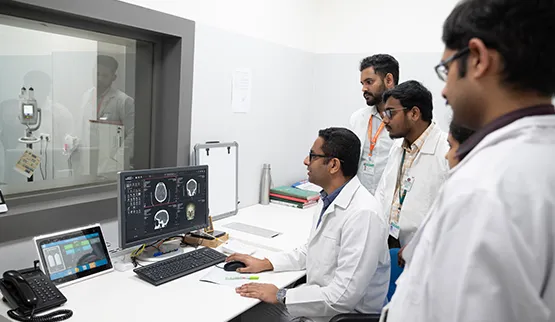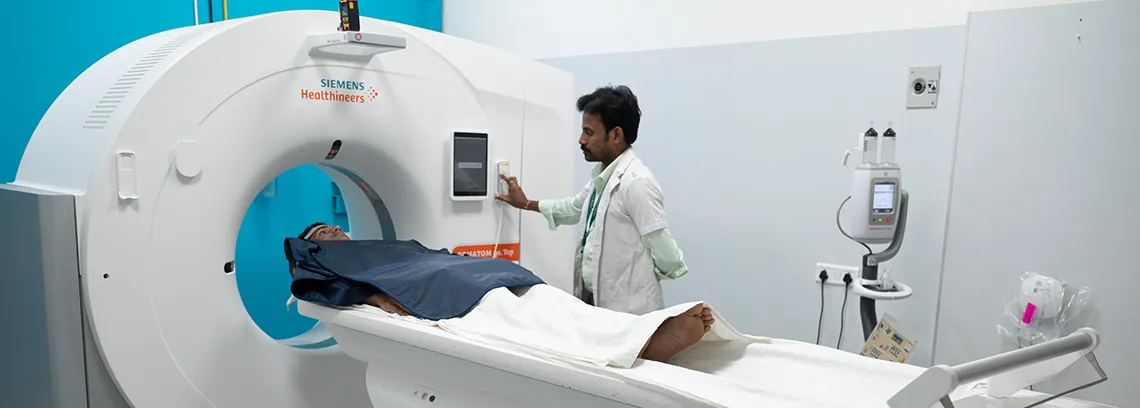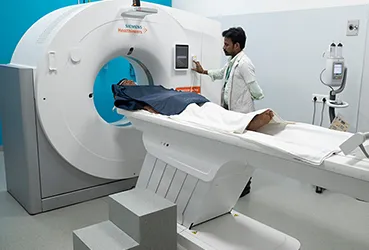Medical Doctorate in Radiodiagnosis
The Medical Doctorate in Radiodiagnosis, also known as a Doctorate of Medicine in Radiodiagnosis, is a three-year doctoral programme that focuses on advanced diagnostic procedures within the medical field, utilising techniques such as ultrasound, resonance imaging, and radiation. The curriculum covers essential subjects including pathology, physiology, and anatomy, equipping students with the knowledge necessary for effective practice in radiodiagnosis.
To be eligible for the Doctor of Medicine degree in Radiodiagnosis, candidates must have completed their MBBS or an equivalent qualification from a university recognised by the Medical Council of India (MCI) and achieved a minimum aggregate score of 55% in their examinations. Admission to the most prestigious MD Radiodiagnosis colleges in India is highly competitive, based on merit, performance in entrance examinations, and subsequent evaluations through group discussions or individual interviews.

Eligibility
- MBBS degree from a recognized institution.
- Completion of internship.
- Qualifying NEET-PG examination.
Scope of the Programme
The scope of employment for graduates of the MD in Radiodiagnosis is extensive, with numerous opportunities available in both public and private institutions. After completing their studies, graduates can embark on diverse career paths, including roles in nursing homes, diagnostic laboratories, and radiology departments, contributing significantly to patient care and medical imaging.
Additionally, graduates may also find opportunities in academia as associate professors of radiology, where they can educate and mentor the next generation of medical professionals. This versatility in career options underscores the importance of Radiodiagnosis in the healthcare sector and highlights the value of expertise in this specialised field.
Key Highlights
Application Domain Experience of Faculty
- Expertise in conventional radiology, fluoroscopy, ultrasound, Doppler, CT, MRI, and basics of interventional radiology
- Insights from esteemed visiting faculty from renowned international institutions
- Faculty members with a robust background in research and clinical training
Infrastructure
- Cutting-edge equipment: Siemens 128-slice CT scanner, 1.5 Tesla GE MRI machine, GE Cath lab
- High-end ultrasound and Doppler machines, along with mammography, X-ray plants, IRTV, and C-arm units
- Well-equipped learning spaces: audio-visual classrooms, seminar rooms, and a dedicated department library
Areas of Excellence
- NMC-aligned curriculum covering cognitive, psychomotor, and affective domains
- Comprehensive training in conventional and advanced radiology techniques
- Integration of interventional radiology and advanced imaging methods
Practical Exposure
- Clinical rotations across various radiological domains, including interventional and advanced imaging
- Hands-on experience with cutting-edge diagnostic and interventional radiology tools
- Opportunities to align practical training with individual research and career goals
Hospitals & Academic Collaborations
- Collaboration with GITAM University departments like Biotechnology, Bioinformatics, Biochemistry, and Artificial Intelligence
- Partnership with other medical institutions for research and clinical exposure
- Regular courses on research basics, literature search, and evidence-based practice
Institutional Social Responsibility
- Engagement in health awareness activities through radiology camps and diagnostic workshops
- Collaboration with local healthcare providers to offer diagnostic support to underserved communities
- Participation
Syllabus
Competency-Based Medical Education (CBME) as directed by the National Medical Commission.
The MD Radiodiagnosis curriculum follows the NMC guidelines, encompassing:
- Conventional Radiology
- Fluoroscopy
- Ultrasound and Doppler Imaging
- CT and MRI
- Basics of Interventional Radiology
- Research Methodologies in Radiology
Key Topics Covered
- Pathology
- Anatomy
- Radiology
- Radiological Physics
- Radiography and processing techniques
Career Options
After completing an MD in Radiodiagnosis in India, graduates can explore a wide array of career options in the thriving healthcare market, valued at $372 billion annually. Medical imaging, a critical component of this industry, is responsible for both diagnosing and treating diseases by producing images that represent the anatomy and organs of the human body. Radiology is particularly significant, accounting for over 80% of all imaging procedures performed in the country. Given the growing demand for medical imaging, fueled by an ageing population and advancements in technology, the career prospects for MD Radiodiagnosis graduates are robust and diverse.
Graduates can pursue various subspecialties within radiology, including dermatology, otorhinolaryngology, orthopaedics, neurology, cardiology, oncology, radiotherapy, medical physics, and MRI or CT scanning. X-ray remains one of the most widely utilised modalities, making up nearly 60% of all imaging conducted annually. With the radiology and imaging market experiencing an annual growth rate of 7% to 10%, there are abundant opportunities for radiologists.
Additionally, innovations such as 3D printing are revolutionising the medical field, allowing healthcare professionals to create detailed physical replicas of patients’ internal conditions from X-rays, further enhancing diagnostic capabilities. Thus, MD Radiodiagnosis graduates can find fulfilling roles in hospitals, diagnostic centres, research institutions, and academia, contributing to advancements in medical imaging and patient care.
Graduates from this programme can pursue careers in various sectors such as:
- Radiology Assistant
- Radiology Technologist/Radiographer
- Radiology Nurse
- Ultrasound Technician / Diagnostic Medical Sonographer
- MRI Technician.
- CT Tech / CAT Scan Technologist / CT Scan Technologist
Infrastructure That Empowers Medical Excellence














Fee Structure
MD (Radio Diagnosis)
Scholarships
Merit-Based Scholarships
The scholarship from GAT/National/State Entrance Tests applies only in the first year. To continue receiving it in subsequent years, a minimum CGPA of 8.0 must be maintained.
Apart from the above, the following scholarships are also offered to eligible students.
- Employee Children Scholarships: (60%, 40%, and 20%)
- Loyalty Scholarships: (10% for Any alumni returning to do higher studies/Children of Alumni/Real siblings (Not applicable to step siblings or cousins)/Children of retired employees of GITAM/Spouse of GITAM employees).
- Sports Scholarships: (100%, 75%, 50%, 25% and 15%)
Need-Based Scholarships
- To be eligible for the need-based scholarship, the combined income of both parents/guardians of the eligible student/If the student is married, the combined income of the family, i.e., the student's and spouse's income, must be less than 12.00 LPA.
- The candidates admitted through merit scholarship in the slabs of 75%, 60%, 40%, 25%,and 15%, and the parents/guardians combined income is less than the prescribed limits are eligible for the additional need-based scholarship.
| Scholarship % | Upgraded Scholarship % |
|---|---|
| 75% | 100% |
| 60% | 75% |
| 40% | 60% |
| 25% | 40% |
| 15% | 25% |
Scholarships For Accommodation
- In addition, students awarded need-based scholarships after merit scholarships will receive an additional 20% scholarship specifically allocated for hostel fees at GITAM for slabs: 15%, 25%, 40%, and 60%.
- Students awarded 75% & 100% scholarships are also awarded the same percentage in the hostel and food charges.
Scholarship Percentage
100%
Eligibility for 2025
GAT 2025 Score >=141 <=200
GPAT Rank >=1 <=500
AP PGCET 2025 Marks >=110 <=120
TS CPGET 2025 Marks >=95 <=100
Scholarship Percentage
75%
Eligibility for 2025
GAT 2025 Score >=121 <=140
GPAT Rank >=501 <=1000
AP PGCET 2025 Marks >=100 <=109
TS CPGET 2025 Marks >=85 <=94
Scholarship Percentage
60%
Eligibility for 2025
GAT 2025 Score >=111 <=120
GPAT Rank >=1001 <=2000
AP PGCET 2025 Marks >=90 <=99
TS CPGET 2025 Marks >=80 <=84
Scholarship Percentage
40%
Eligibility for 2025
GAT 2025 Score >=101 <=110
GPAT Rank >=2001 <=3000
AP PGCET 2025 Marks >=80 <=89
TS CPGET 2025 Marks >=75 <=79
Scholarship Percentage
25%
Eligibility for 2025
GAT 2025 Score >=91 <=100
GPAT Rank >=3001 <=4000
AP PGCET 2025 Marks >=70 <=79
TS CPGET 2025 Marks >=65 <=74
Scholarship Percentage
15%
Eligibility for 2025
GAT 2025 Score >=81 <=90
GPAT Rank >=4001 <=6000
AP PGCET 2025 Marks >=55 <=69
TS CPGET 2025 Marks >=50 <=64








